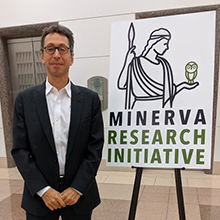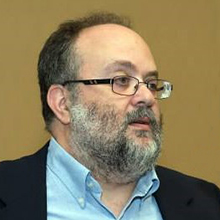Principal Investigator
 Steven Lobell
Steven Lobell
University of Utah
Steven E. Lobell is the Principal Investigator on the Minerva Research Initiative award. He is professor in the Political Science Department at the University of Utah in Salt Lake City, Utah. His research interests include neoclassical realism, the political economy of security, societal constraints on foreign policy making, the challenge of hegemony and great power competition, and emerging and aspiring states. Lobell has published seven books, most recently, Neoclassical Realist Theory of International Politics (Oxford: Oxford University Press, 2016 with Norrin M. Ripsman and Jeffrey W. Taliaferro) and The Political Economy of Regional Peacemaking (University of Michigan Press, 2016, with Norrin M. Ripsman). Lobell has published journal articles in Security Studies, International Studies Quarterly, International Studies Review, Review of International Studies, Political Science Quarterly, Journal of Strategic Studies, and co-edited a special issue of International Politics on “Regional Contestation to Rising Powers.” He was awarded a Fulbright Scholar in Israel and a visiting research fellow at The Nobel Institute.
Co-investigators
 Victor Asal
Victor Asal
SUNY University at Albany
Victor Asal (Phd University of Maryland, 2003) is Director of the Center for Policy Research and a Professor of Political Science at the University at Albany. He is also, along with R. Karl Rethemeyer, the co-director of the Project on Violent Conflict. Dr Asal is focusing on Nonstate actor behavior in near crises related to the Minerva grant being led by Dr. Steven Lobel. Dr. Asal is also affiliated with the National Consortium for the Study of Terrorism and Responses to Terrorism (START), a Department of Homeland Security Center of Excellence. Dr. Asal’s research focuses on the choice of violence by nonstate organizational actors as well as the causes of political discrimination by states against different types of groups including, ethnic minorities, sexual minorities and women. In addition, Prof. Asal has done research on the impact of nuclear proliferation on crisis behavior and on the pedagogy of simulations and games. Asal has been involved in research projects funded by the Defense Advanced Research Projects Agency, Defense Threat Reduction Agency, The Department of Homeland Security, The National Science Foundation, and The Office of Naval Research.
 Kyle Beardsley
Kyle Beardsley
Duke University
Kyle Beardsley (Ph.D., UCSD, 2006) is Professor of Political Science. He is co-director of the International Crisis Behavior data project. His research interests include the political consequences and causes of third-party involvement in peace processes, the nature of intrastate rebellion, the implications of gender power imbalances within and through post-conflict security forces, and the effects of nuclear-weapons proliferation on crisis behavior. His first book, The Mediation Dilemma, explores how third-party conflict management frequently does well in securing short-term peace but also can contribute to greater instability in the long run, especially when the third parties rely on leverage. His second book (co-authored with Sabrina Karim), Equal Opportunity Peacekeeping, examines the consequences of and potential solutions to gender power imbalances in peace operations.
 Nakissa Jahabani
Nakissa Jahabani
Combating Terrorism Center at West Point
Nakissa Jahanbani is an instructor and researcher at the Center. She studies political violence, focusing on questions of state-proxy relationships, specifically Iran’s network of Shi`a militias. Relatedly, her dissertation explores related state-proxy questions through regression, hazard models, and network analysis. She has published in Small Wars and Insurgencies, PS: Political Science, and Journal of Political Science Education. She is fluent in Persian and is learning Arabic. She was an ICPSR Clifford C. Clogg Scholarship recipient and later a teaching assistant in the same program.
 Patrick James
Patrick James
University of Southern California
Patrick James is Dornsife Dean’s Professor of International Relations at the University of Southern California (PhD, University of Maryland, College Park). James is the author or editor of 30 books and over 150 articles and book chapters. Among his honors and awards are the Louise Dyer Peace Fellowship from the Hoover Institution at Stanford University, the Milton R. Merrill Chair from Political Science at Utah State University, Lady Davis Professorship of the Hebrew University of Jerusalem, Thomas Enders Professorship in Canadian Studies at the University of Calgary, Senior Scholar award from the Canadian Embassy, Washington, DC, Eaton Lectureship at Queen’s University in Belfast, Quincy Wright Scholar Award from the International Studies Association (ISA) (Midwest), Beijing Foreign Studies University Eminent Scholar, Eccles Professor of the British Library and Ole R. Holsti Distinguished Scholar of the ISA (West). He is a past president of the ISA (Midwest) and the Iowa Conference of Political Scientists. James has been Distinguished Scholar in Foreign Policy Analysis for the ISA, 2006-07, and Distinguished Scholar in Ethnicity, Nationalism and Migration for ISA, 2009-10. He served as President, 2007-09, of the Association for Canadian Studies in the United States, President of the International Council for Canadian Studies, 2011-13, President of the Peace Science Society, 2016-17, and President of the International Studies Association, 2018-19. James also served a five-year term as Editor of International Studies Quarterly.
 Norrin Ripsman
Norrin Ripsman
Lehigh University
Norrin M. Ripsman (Ph.D. University of Pennsylvania, 1997) is Monroe J. Rathbone Distinguished Professor of International Relations at Lehigh University. His primary research interests include: democracy and national security, postwar peacemaking, constructing regional stability, the political economy of national security, neoclassical realism, crises/pre-crises, and the impact of globalization on national security. He has published nine books, most recently Peacemaking from Above, Peace from Below: Ending Conflict Between Regional Rivals (Ithaca, NY: Cornell Studies in Security, Cornell University Press, 2016) and (with Jeffrey W. Taliaferro and Steven E. Lobell) Neoclassical Realist Theory of International Politics (New York: Oxford University Press, 2016), and over 25 peer-reviewed articles in International Security, International Studies Quarterly, Security Studies, and other high quality outlets.
 Scott Silverstone
Scott Silverstone
University of Pennsylvania
Scott Silverstone (Ph.D., University of Pennsylvania, 1999) is a Professor of International Relations and Deputy Head in the Department of Social Sciences at West Point, where he has served on the faculty since 2001. His research focuses on international security, American foreign policy, and great power politics. He is a Senior Fellow with the Center on the Future of War at Arizona State University and New America, a Senior Fellow with the Center on the Study of Statesmanship at Catholic University, and an Adjunct Professor with Bard College’s Globalization and International Affairs Program. He is the author of three books - From Hitler’s Germany to Saddam’s Iraq: The Enduring False Promise of Preventive War (2018), Preventive War and American Democracy (2007), and Divided Union: The Politics of War in the Early American Republic (2004) – and numerous articles and book chapters. Silverstone began his career as a U.S. naval officer serving as a Naval Flight Officer with a P-3 Orion squadron from 1987 to 1990 and as a crisis management officer and planner on the staff of the Deputy Chief of Naval Operations for Plans, Policy, and Operations in the Pentagon from 1990 to 1993.
